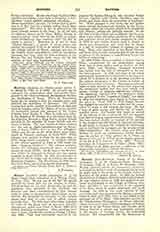

Bouvier, JEAN-BAPTISTE, Bishop of Le Mans, theologian, b. at St. Charles-la-Fork, Mayenne, January 16, 1783; d. at Rome, December 28, 1854. Having received merely an elementary education, he learned his father’s trade of carpentry, but he gave his spare time to the study of the classics under the direction of the parish priest. In 1805 he entered the seminary of Angers, where he made rapid progress. He was ordained priest in 1808 and appointed professor of philosophy at the College of Chateau Gonthier. In 1811 he was transferred to the seminary of Le Mans, where he taught philosophy and moral theology. In 1819 he was made superior of that institution and vicar-general of the diocese, a position which he held until 1834, when he was raised to the episcopal see of Le Mans. The influence exerted by his “Institutiones Theologicae” (in fifteen editions), which was in use in almost all the seminaries of France, as well as in the United States and Canada, gives Bishop Bouvier a unique and honorable position in the history of theology during the nineteenth century. His compendium had the distinction of being the first manual, and for many years the only one well adapted to that period of transition (1830-70), marked on the one hand by the death struggles of Gallicanism and Jansenism, and on the other by the work of reform undertaken in all departments of ecclesiastical learning.
At first, Bishop Bouvier published separate theological treatises, which formed a collection of thirteen volumes (1818-33), reduced in 1834 to six, and published in that form until 1852. The author endeavored to improve his work in the successive editions, but his failure to remove from it all traces of Gallicanism provoked criticism. A Gallican, through prejudices derived from his early training rather than from personal conviction, Bouvier readily consented to submit his work to the corrections of the theologians appointed by Pius IX. Their revision resulted in the eighth edition (1853). After the death of Bouvier, the professors of the seminary of Le Mans eliminated many imperfections which had been overlooked by the revisers of 1853. The manual was shortly afterwards adopted in more than sixty seminaries. Bouvier’s treatment of moral theology is remarkable; he took a decided stand against Jansenism and adopted the doctrines of St. Alphonsus; though even this reaction against rigorism did not bring his work up to the standard of the manuals of theology of the present time.
Some critics condemned much of the information in the “Institutiones” as a crude and confused mass, irrelevant, and only indirectly connected with moral theology. It must be recalled, however, that Bishop Bouvier did not enjoy the advantages of the present day, when the various branches of clerical study are classified, and each given its proper place. Not-withstanding the incompleteness of preparatory studies eighty years ago, the scarcity of vocations, the urgent need of priests, and limited pecuniary resources made it necessary to limit the clerical course to three years and, at the same time, to include in the curriculum all the studies necessary for the exercise of the sacred ministry in parishes. Under such circumstances it was impossible to observe nice distinctions in the classification of ecclesiastical sciences. However, in spite of defects, the “Institutiones Theologicae” will stand as a signal achievement on the morrow of the Revolution. The bishop gradually brought the education of the clergy out of the errors and lethargy of the preceding chaotic age, and prepared for the reforms of the latter part of the nineteenth century. Like Cardinal Gousset he must be regarded as one of the foremost reformers of moral theology. Pius IX conceived the highest es-teem for him and invited him to be present at the definition of the dogma of the Immaculate Conception.
P. DISSER

